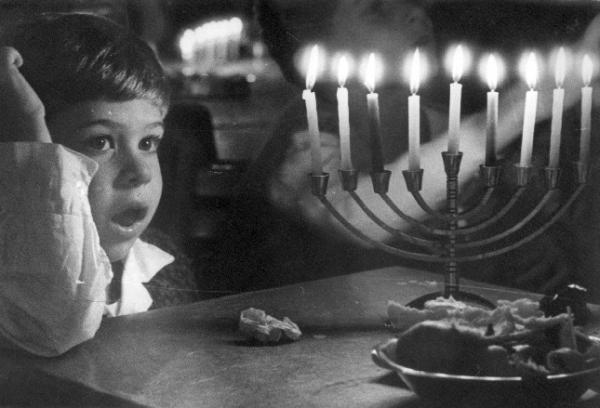The Lilith Blog 1 of 2
December 15, 2011 by Maya Bernstein
Shine

Hashomer Hatzair Archives Yad Yaari
My oldest daughter recently performed in her kindergarten’s annual Thanksgiving Extravaganza. What is it about watching your kid in a school performance that turns a parent into dripping, slobbering mush? There is something so visceral about seeing your kid “up there,” shirt tucked in, braids in place, belting out songs and moving like a turkey and reciting her two lines. As the child stands there, hands stiff at her side, telling the i-phoned face audience of grandparents and parents and siblings, “our next song is ‘Run Turkey Run,’” the parent has a moment of meaning and purpose. I have made a difference in the world. My child is doing something; she is active, she is a participant, she is a contributor. It is invaluable to see your child represent something greater than herself, participate in creating meaning with others, and share that meaning with her world. That is where children shine, and that, in turn, re-connects their parents to what is valuable and important in their lives.
The winter holiday season is upon us, and it is an opportunity to shine. Chanukah, probably the most celebrated and public of all Jewish holidays, has two core components to its celebration. The first is lighting Chanukah candles, one candle on the first night, two on the second, three on the third, increasing the light and the candles until eight burn bright on the last night. The second, as important as the first, is publicizing the celebration of the holiday. That is why it is customary to light candles in the windows or doorframes, so that passer-bys can see, and say, “Look! The lights of Chanukah!” As we remind ourselves as a Jewish community of our story of survival, we share that story with others.
Chanukah is a wonderful opportunity not only to celebrate family and community, but also to explore how to share one’s own identity and values with others. Chanukah challenges us to ask: What are the appropriate ways to celebrate your exclusive identity? How do you do that without excluding others on the one hand, or diluting yourself and your community on the other?
These questions are pretty heady, especially for children, and can send you spinning, which is why it’s great to put them aside for a game of dreidel or a scrumptious meal of potatoes or jelly donuts or anything else fried in oil. But in our family, we also take the opportunity of having eight festive nights of eating and playing together to talk about the various “lights” we want to increase in the world, and why it is important to share those dreams and hopes with others. In today’s vibrant, interconnected world, this second component of Chanukah is so powerful to discuss with children. What does it mean to “publicize” yourself? What is the best way to do it? What can Chanukah teach you about how you share of yourself in ways that inspire and contribute to the world?
It occurred to me that on this holiday, during this dark time of year, it is almost as if we are trying to create that visceral reaction that we as parents feel when we see our children shine, that feeling of joy and connection and meaning, for the entire world. For Chanukah is a celebration of values, a reminder that a small group of passionate individuals connected to their purpose can persevere, make an impact, and contribute. Its message resonates for children – nobody is too small to make a difference, and no light that ignites the darkness is insignificant.
Chanukah is both an inspiration and a challenge to shine. It is a reminder that the feelings of vulnerable delight we have when our children touch us are feelings we should embrace, and that we should act in the world to instill those feelings in others. That we should strive to emerge, bright and flickering, in the window, exposed to all, and to stand for something. To come out on stage, in front of all of our loved ones, and increase the light.
 Please wait...
Please wait...